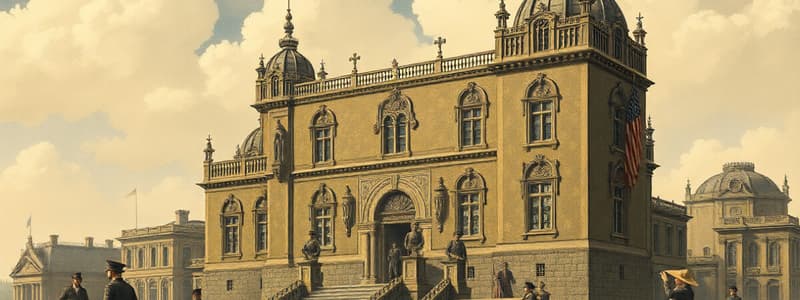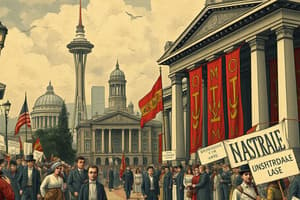Podcast
Questions and Answers
Which individual is recognized as the 'Father of the Constitution'?
Which individual is recognized as the 'Father of the Constitution'?
- James Madison (correct)
- George Washington
- Thomas Jefferson
- John Adams
What was a primary focus of the Federalists compared to the Democratic-Republicans?
What was a primary focus of the Federalists compared to the Democratic-Republicans?
- Promoting a weak central government
- Supporting a strong central government (correct)
- Emphasizing states' rights
- Advocating for a monarchy
Which concept significantly influenced colonial revolutionary thought?
Which concept significantly influenced colonial revolutionary thought?
- Totalitarianism
- Despotism
- Liberty and equality (correct)
- Monarchy
What was one of the consequences of westward expansion post-Revolution?
What was one of the consequences of westward expansion post-Revolution?
What was one of the enduring legacies established during the early years of the United States?
What was one of the enduring legacies established during the early years of the United States?
What was a significant outcome of the French and Indian War regarding the relationship between Britain and its colonies?
What was a significant outcome of the French and Indian War regarding the relationship between Britain and its colonies?
What was the purpose of the Proclamation of 1763?
What was the purpose of the Proclamation of 1763?
Which event directly resulted from the implementation of the Stamp Act?
Which event directly resulted from the implementation of the Stamp Act?
Which battle is recognized as the turning point in the American Revolution?
Which battle is recognized as the turning point in the American Revolution?
What was a major issue with the Articles of Confederation?
What was a major issue with the Articles of Confederation?
What was the primary cause of Shays' Rebellion?
What was the primary cause of Shays' Rebellion?
What fundamental principle does federalism embody?
What fundamental principle does federalism embody?
Which document served as the first governing framework of the United States?
Which document served as the first governing framework of the United States?
Flashcards are hidden until you start studying
Study Notes
APUSH Period 3 (1754-1800) Study Notes
Key Events
-
French and Indian War (1754-1763)
- Conflict between Britain and France in North America.
- Resulted in British territorial gains but increased colonial taxes and resentment.
-
Proclamation of 1763
- Restricted colonial expansion west of the Appalachian Mountains.
- Aimed to stabilize relations with Native Americans.
-
Stamp Act (1765)
- First direct tax on the colonies, requiring purchase of stamp paper for documents.
- Led to widespread protests and formation of the Sons of Liberty.
-
Boston Massacre (1770)
- Clash between British soldiers and Boston colonists.
- Resulted in the death of five colonists and increased anti-British sentiment.
-
Boston Tea Party (1773)
- Colonial protest against the Tea Act, which favored British tea merchants.
- Colonists dumped 342 chests of tea into Boston Harbor.
-
First Continental Congress (1774)
- Delegates from 12 colonies met to organize resistance against British policies.
- Called for a boycott of British goods and an end to the Intolerable Acts.
-
American Revolution (1775-1783)
- War for independence from Britain.
- Key battles: Lexington and Concord, Bunker Hill, Saratoga, Yorktown.
-
Declaration of Independence (1776)
- Document authored by Thomas Jefferson asserting colonial independence.
- Inspired by Enlightenment ideas of natural rights and government by consent.
-
Articles of Confederation (1781)
- First governing document of the U.S., establishing a weak central government.
- Problems included lack of taxation power and inability to regulate commerce.
-
Shays' Rebellion (1786-1787)
- Armed uprising in Massachusetts against economic injustices.
- Highlighted weaknesses of the Articles and prompted calls for a stronger federal government.
-
Constitutional Convention (1787)
- Meeting to address weaknesses of the Articles of Confederation.
- Resulted in the U.S. Constitution, establishing a stronger federal framework.
-
Bill of Rights (1791)
- First ten amendments to the Constitution guaranteeing individual liberties.
- Addressed Anti-Federalist concerns about government power.
Key Concepts
-
Federalism
- Distribution of power between the national and state governments.
-
Separation of Powers
- Divides government into three branches: Legislative, Executive, and Judicial.
-
Checks and Balances
- Each branch of government has the ability to limit the powers of the others to prevent abuse.
-
Enlightenment Influence
- Ideas of liberty, equality, and democracy shaped colonial views and revolutionary thought.
Important Figures
-
George Washington
- Commander of the Continental Army and first President.
-
Thomas Jefferson
- Principal author of the Declaration of Independence and advocate for individual rights.
-
Alexander Hamilton
- First Secretary of the Treasury, promoted a strong central government and economic plan.
-
James Madison
- "Father of the Constitution" and key figure in drafting the Bill of Rights.
-
John Adams
- Advocate for independence and later second President, helped navigate early government politics.
Social and Economic Changes
-
Emergence of Political Parties
- Federalists vs. Democratic-Republicans over the role of government and interpretation of the Constitution.
-
Increased Political Participation
- Growing involvement in politics among a wider segment of the population, including debates over rights and representation.
-
Impact on Native Americans
- Displacement and conflict as settlers expanded westward post-Revolution.
Legacy
- Established principles of democracy, rule of law, and individual rights that influence the U.S. political system today.
French and Indian War (1754-1763)
- Conflict between Britain and France for control of North America.
- British victory resulted in territorial gains but also increased colonial taxes and resentment.
- Proclamation of 1763: Restricted colonial expansion west of the Appalachian Mountains.
- Aimed to appease Native American tribes and prevent further conflict.
Colonial Resistance
- Stamp Act (1765): First direct tax on the colonies, requiring purchase of stamp paper for documents.
- Led to widespread protests, boycotts, and formation of the Sons of Liberty.
- Boston Massacre (1770): Clash between British soldiers and Boston colonists.
- Five colonists were killed, fueling anti-British sentiment.
- Boston Tea Party (1773): Colonial protest against the Tea Act, which favored British tea merchants.
- Colonists dumped 342 chests of tea into Boston Harbor.
Road to Revolution
- First Continental Congress (1774): Delegates from 12 colonies convened to organize resistance against British policies.
- Called for a boycott of British goods and an end to the Intolerable Acts.
- American Revolution (1775-1783): War for independence from Britain.
- Key battles include: Lexington and Concord, Bunker Hill, Saratoga, Yorktown.
Founding Documents
- Declaration of Independence (1776): Document authored by Thomas Jefferson asserting colonial independence.
- Based on Enlightenment ideas of natural rights and government by consent.
- Articles of Confederation (1781): First governing document of the U.S., creating a weak central government.
- Weakened by lack of taxation power and inability to regulate commerce.
Challenges to the New Nation
- Shays' Rebellion (1786-1787): Armed uprising in Massachusetts against economic injustices.
- Exposed the weakness of the Articles of Confederation and the need for a stronger federal government.
- Constitutional Convention (1787): Meeting to revise the Articles of Confederation.
- Resulted in the U.S.Constitution, establishing a stronger federal framework.
- Bill of Rights (1791): First ten amendments to the Constitution guaranteeing individual liberties.
- Addressed Anti-Federalist concerns about government power
Key Concepts
- Federalism: Distribution of power between the national and state governments.
- Separation of Powers: Dividing government into three branches: Legislative, Executive, and Judicial.
- Checks and Balances: Each branch of government can limit the powers of the others to prevent abuse.
- Enlightenment Influence: Ideas of liberty, equality, and democracy shaped colonial views and revolutionary thought.
Important Figures
- George Washington: Commander of the Continental Army and first President.
- Thomas Jefferson: Principal author of the Declaration of Independence and advocate for individual rights.
- Alexander Hamilton: First Secretary of the Treasury, promoted a strong central government and economic plan.
- James Madison: "Father of the Constitution" and key figure in drafting the Bill of Rights.
- John Adams: Advocate for independence, second President, and contributed to the early development of government politics.
Social and Economic Changes
- Emergence of Political Parties: Federalists vs. Democratic-Republicans debated the role of government and the interpretation of the Constitution.
- Increased Political Participation: Growing involvement in politics among a wider segment of the population, including debates over rights and representation.
- Impact on Native Americans: Displacement and conflict as settlers expanded westward following the Revolution.
Legacy
- Established principles of democracy, rule of law, and individual rights that continue to influence the U.S. political system today.
Studying That Suits You
Use AI to generate personalized quizzes and flashcards to suit your learning preferences.




